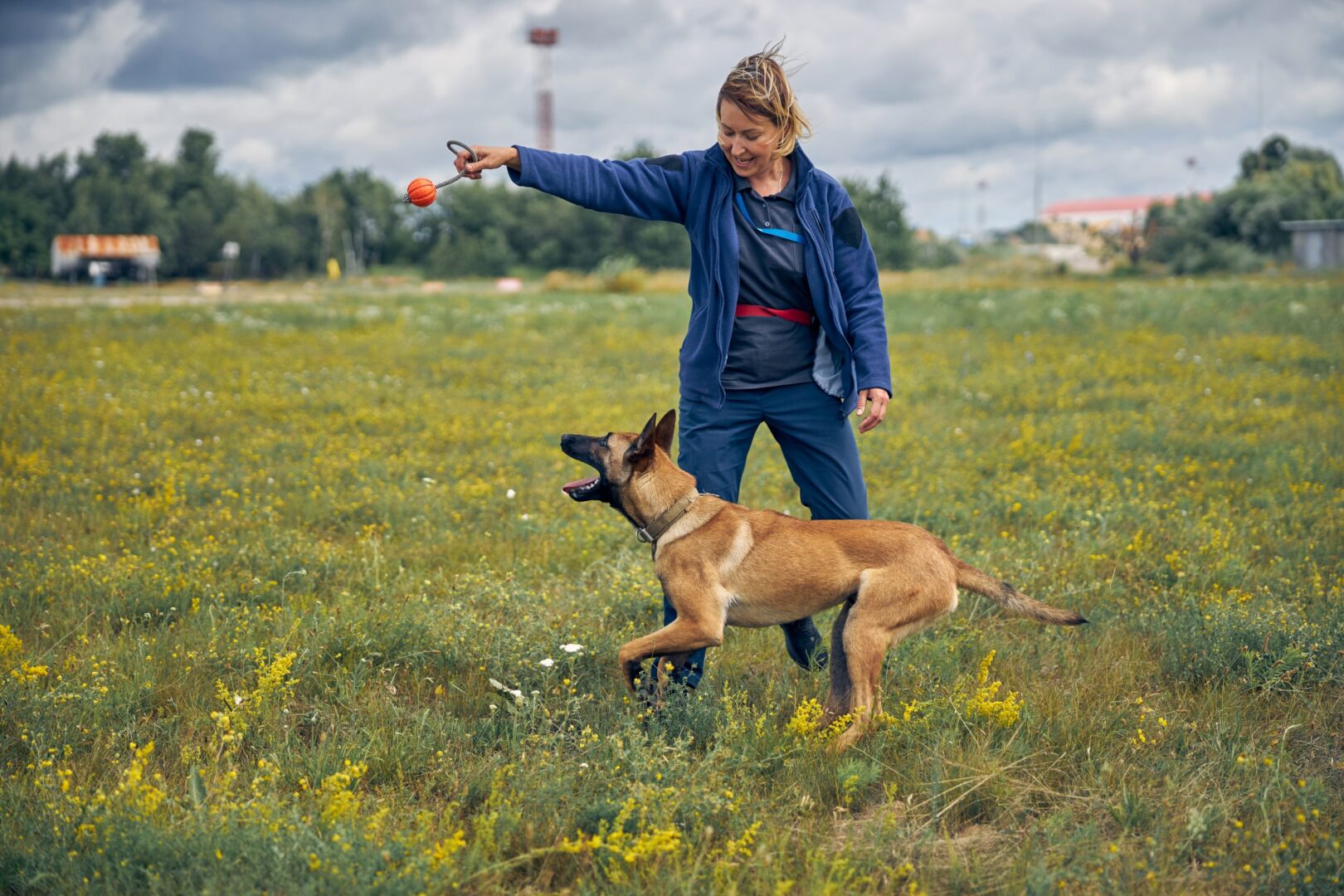
Are All Dogs Trainable: What You Need to Know
At some point, every dog owner wonders: are all dogs trainable? The short answer to that question is “yes,” but there’s much more you need to know before determining if your dog can be trained and, more importantly, the best method for preparing them.
The Dan Gentile Dog Training Center understands that all dogs learn differently. Our dog training services in Howell Township, NJ focus on customized canine education, considering your dog’s breed, personality, and unique skills as we craft a program to train your dog.
Read on to learn more about how dogs learn and what dog breeds may be more difficult to train (though not impossible).

Your Dog’s Age
Regardless of your dog’s age, we are capable of learning just about anything. However, if the training you want with your older dog runs contrary to their long-term habits, you may have a difficult time.
A more immediate issue influencing an older dog’s trainability involves their medical health. Cognitive Dysfunction Syndrome (CDS) may develop in your dog as they age. This neurobehavioral disorder is very similar to dementia in humans and affects senior dogs in their daily lives, including training.
There are supplements and foods available that can help relieve CDS symptoms and improve cognitive function, including Senilife and Purina ProPlan Veterinary Diet NC Neurocare.
It is much easier to train a puppy than it is to retrain an adult dog, though there are particular challenges to puppy training as well. It is recommended to start training your new puppy as soon as you bring them home. Certain periods of puppy development can make training more complicated, so be careful during teething and fear periods.
Fear periods are times in your puppy’s life when they will be very sensitive to bad experiences and are more likely to be frightened by a variety of things. Fear periods are so significant for developing puppies that things that frighten them during these periods may scare them for the rest of their lives.
Your Dog’s Breed
Dogs have been selectively bred for hundreds of years, developing specific physical traits and enhancing working abilities to create specialized dogs that can learn some training and behaviors more quickly than others.
“Smart” dogs aren’t necessarily more trainable. Dogs that are considered above average in their intelligence, including Border Collies, Poodles, and German Shepherds, receive this designation because they are easy to train. This labeling, however, is more due to obedience and an innate need to look to their owners for direction.
Some truly intelligent dogs, such as the sighthounds, are notorious for being “dumb.” The Afghan Hound, for example, is often thought to be quite dim but actually possesses an almost human intellect.
The criticism of their intelligence stems from their still primitive nature and preference to work independently. Though they have minimal motivation to please humans, they can be persuaded to embrace training in other ways.
Dogs With Disabilities
When you ask, “are all dogs trainable?” you have to consider how much training your dog may have been exposed to and how responsive they have been to it. If your dog has a physical or mental disability, it can be more challenging to train them. CDS is a problem that may develop with age, but other physical and mental disabilities can hinder a dog’s ability to learn at any age.
Deafness
Obviously, a dog with a hearing impairment will not be able to respond appropriately to verbal commands. You can, however, adjust your training techniques to accommodate their disability, such as using hand signals instead of verbal commands.
The most challenging part of training a dog with a hearing impairment is getting their attention. Therefore, breeds more focused on humans will have a more accessible time training with a hearing deficit than an independent type of dog would have.
Blindness
Visual impairment will not hinder a dog from hearing your verbal commands, but body language will be impossible depending on the degree of blindness. Patience and the proper training techniques can help dogs learn basic rules and behavioral orders with little to no sight.
Physical Disabilities
Physical disabilities, such as arthritis or missing limbs, can make it more difficult for your dog to respond to commands quickly, but it won’t keep them from learning. If your dog has any physical limitations like this, you will have to adjust your training to make it easier for them to obey commands and learn.
Emotional Disabilities
Anxiety, fear, and extreme stress can keep dogs from thinking clearly, forcing them to respond instinctively. When dogs are in this mode, it is almost impossible to train them successfully. In order to train them, you have to bring them out of that mode of fear and stress and into a more relaxed frame of mind.
Training Methods
All dogs can be trained, but the method for teaching them will vary from dog to dog. Sometimes when a dog is not responding to training, you just need to try a different training style.
Training trends have varied over the years, moving from methods based on compulsion to techniques using positive reinforcement. Both types of training work with some dogs, but most dogs respond the best to training methods somewhere in the middle.
The biggest challenge when it comes to training your dog is finding the suitable method for them. Some dogs do well in a classroom environment, while others shine with a private trainer. In any case, the best trainers will be familiar with various methods and have the experience to work with your dog in the best way for them to learn and grow.
Training Assistance
Are all dogs trainable? Absolutely! If you are struggling with your dog’s behavior or if you’re ready to start training your puppy, call us at The Dan Gentile Dog Training Center. We offer a wide range of training programs, including an inboard training program for dogs–it’s like “summer camp” for dogs!
Expert Dog Training in Monmouth County, NJ
If you’re searching for reliable dog training in Monmouth County, The Dan Gentile Dog Training Center is a top choice for local pet owners. Located in Howell Township, we’ve provided professional dog training services for over 40 years—serving communities across Freehold, Marlboro, Red Bank, and the surrounding areas.
We specialize in customized obedience training programs for dogs of all breeds, ages, and behavior levels. Whether your dog struggles with aggression, reactivity, or basic manners, our structured board and train program helps dogs achieve lasting results in a controlled, supportive environment. Our approach blends positive reinforcement with decades of experience to help even the most challenging dogs become well-behaved companions.
Our services include:
-
Puppy training foundations
-
Advanced obedience and off-leash control
-
Behavior modification for anxiety and aggression
-
Support for senior dogs and dogs with disabilities

Why are we the answer for dog training near me in Monmouth County?
- Local Expertise, Global Standards: Our decades of experience aren’t just limited to New Jersey; Dan Gentile has mentored trainers across the tri-state area. This deep understanding of canine behavior, combined with our strong Monmouth County presence, means your dog receives top-tier, relevant training.
- Tailored Programs for Monmouth County Dogs: We know every dog is an individual. Whether you’re in Freehold, Colts Neck, Red Bank, or Manalapan, our customized training programs, especially our popular board-and-train, address specific issues like aggression, reactivity, leash pulling, or basic obedience, providing real solutions for Monmouth County families.
- Answers for Your Dog’s Needs:
- “My dog is aggressive in Monmouth County, can you help?” Unfortunately, we do not currently train aggressive dogs. We specialize in behavior modification for issues like dog obedience training, anxiety and fear, offering a structured environment that leads to lasting change.
- “Do you offer puppy training near me in Monmouth County?” Absolutely! Our puppy foundation program builds confidence and manners for young dogs, ensuring a great start for your new companion.
- “What makes your board-and-train in Monmouth County effective?” Our immersive, 2-week board-and-train at our Howell Township facility provides consistent, professional guidance, handling everything from housebreaking to advanced off-leash commands. We include owner hand-off sessions and continued support to ensure success back in your Monmouth County home.

As a veteran-owned, licensed facility dedicated to Monmouth County dog training, we pride ourselves on providing a safe, structured, and highly effective environment for your beloved companion. Don’t settle for less when it comes to your dog’s education. If you’re looking for the best dog trainers in Monmouth County to help your dog become a well-behaved family member, contact us today for a consultation. Let us show you why we are the go-to resource for comprehensive dog training solutions in Monmouth County, NJ.
Looking for dog training in Monmouth County that actually works? Contact us today to learn more about our proven programs or to schedule a free evaluation.
Give us a call at (732) 938-5040 and start today!
Enjoy This Article? You May Also Like:
- Trusted Puppy Training in Monmouth County, NJ – Dan Gentile Dog Training Center
- Build a Lasting Bond with Your Dog with Dan Gentile Dog Training Center
- The Best Dog Trainer in New Jersey: Why Dan Gentile Dog Training Center Is #1 for Obedience, Behavior & Results
- How to Stop Excessive Dog Barking: What Every NJ Dog Owner Needs to Know